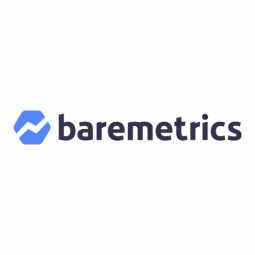BareMetrics

Overview
|
HQ Location
United States
|
Year Founded
2013
|
Company Type
Private
|
Revenue
< $10m
|
|
Employees
11 - 50
|
Website
|
Twitter Handle
|
Company Description
Baremetrics provides real-time subscription metrics for teams built with Stripe, Shopify Partners, Braintree, Recurly, Chargebee, Google Play, and App Store Connect. In addition to metrics, Baremetrics provides tools that help you reduce churn and grow your business faster:
IoT Snapshot
BareMetrics is a provider of Industrial IoT platform as a service (paas), networks and connectivity, sensors, application infrastructure and middleware, functional applications, and infrastructure as a service (iaas) technologies, and also active in the buildings, cement, e-commerce, education, equipment and machinery, and finance and insurance industries.
Technologies
Use Cases
Functional Areas
Industries
Services
Technology Stack
BareMetrics’s Technology Stack maps BareMetrics’s participation in the platform as a service (paas), networks and connectivity, sensors, application infrastructure and middleware, functional applications, and infrastructure as a service (iaas) IoT Technology stack.
-
Devices Layer
-
Edge Layer
-
Cloud Layer
-
Application Layer
-
Supporting Technologies
Technological Capability:
None
Minor
Moderate
Strong

Supplier missing?
Start adding your own!
Register with your work email and create a new supplier profile for your business.
Case Studies.
Case Study
Grokability's Journey: Recovering $150k in Failed Charges with Baremetrics
Grokability, a company founded by Alison Gianotto, was facing a significant challenge. Alison needed a quick and efficient way to evaluate her business performance. However, she was overwhelmed with other tasks and didn't have the time to dig deep for answers. As the company grew, time management became less of an issue, but a new problem arose - recovering payments. Alison was managing the help desk, working on installations, and writing software code all by herself. She was strapped for time and needed a solution that would allow her to easily visualize company metrics and glean company insights, without having to build her own tool from scratch.
Case Study
Cancel Timeshare's Rapid Growth and Revenue Recovery with Baremetrics
Cancel Timeshare, a Myrtle Beach based company, was experiencing rapid growth and needed a tool to manage and analyze data from Stripe, handle dunning, and consolidate customer information. The company, which helps timeshare owners exit their contracts, was manually tracking revenue across multiple apps and spreadsheets, which was time-consuming and inefficient. Additionally, they were losing revenue due to failed payments, a common issue for subscription-based businesses. The challenge was to find a solution that could streamline their data management, recover failed payments, and support their customer service goals.
Case Study
UXPin's Journey to Efficient SaaS Metrics Tracking with Baremetrics
UXPin, a code-based design tool company, was facing a significant challenge in consolidating and analyzing their subscription data. Initially, they used both PayLane and PayPal to process payments. However, when they moved to the United States, they were unable to migrate their Poland-based PayPal subscriber data. This was a significant issue as these customers constituted a large portion of their revenue. To address this, they decided to maintain their Polish PayPal account while also establishing a separate payment processor in the US. This decision led to the challenge of maintaining two separate payment processors and the need to consolidate and analyze data from both. UXPin built internal tools to analyze activity, but these tools required ongoing maintenance, often crashed, and did not provide the insights they needed. By October 2020, 99% of UXPin’s customers were paying via Stripe, and they needed a solution to efficiently analyze this data and support their growth.
Case Study
Sync with Connex: Recovering Lost Revenue and Optimizing Operations with Baremetrics
Sync with Connex, a successful SaaS company, faced several challenges in its growth journey. The company needed to track data from Stripe, recover failed credit card payments, and optimize their cancellation flow. They were also struggling with manual data entry, a tedious and error-prone task that consumed significant time and resources. Additionally, they were using PayPal for processing payments, which offered little additional value and lacked the necessary reporting tools. The company was essentially operating with limited visibility into important customer details. The lack of an effective dunning system led to failed payments and a high volume of customer complaints, which further strained their customer success team.
Case Study
MetricFire Enhances Business Analytics with Baremetrics
MetricFire, a small yet powerful team, was facing challenges in efficiently analyzing data from Stripe and segmenting their customers. The company, which offers infrastructure, system, and application monitoring using a suite of open-source monitoring tools, had to delegate billing and financial reporting to their Business Operations Manager, Elliot Langston, due to a team reorganization. Langston was using MetricFire’s Stripe account for these tasks. However, Stripe’s in-app metrics feature was limited to just 16 metrics and often gave misleading Monthly Recurring Revenue (MRR) figures due to occasional bugs and counting non-recurring revenue towards MRR. Langston had to create dummy accounts in Stripe to correct these inaccuracies, a process that was not sustainable and risked billing mistakes. Additionally, Stripe did not allow customization of date views and lacked the ability to segment customer data, making it difficult for Langston to efficiently organize customers by geographic location.
Case Study
Smart Passive Income's Growth and Revenue Recovery with Baremetrics
Smart Passive Income (SPI) was facing a couple of significant challenges. Firstly, they were using multiple tools to run their business, each with its own analytics dashboard. However, these tools were not interconnected, limiting the amount of usable data SPI could access. This lack of comprehensive data made it difficult for the SPI team to make informed business decisions. Secondly, SPI was struggling with the recovery of failed payments from members of their SPI Pro community. This was causing a loss of revenue and potential disruption in the continuity of memberships.



